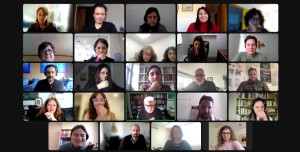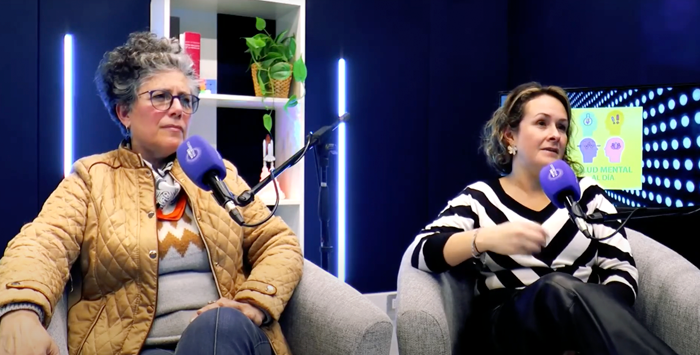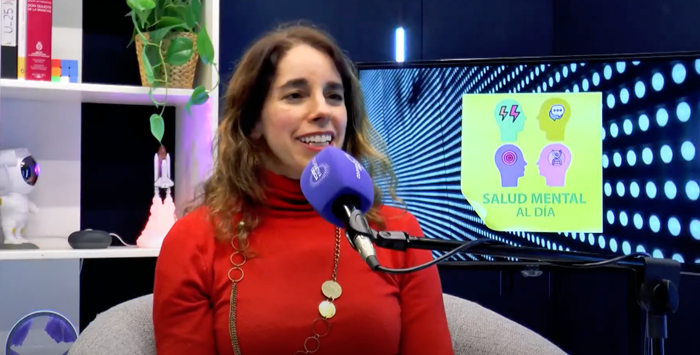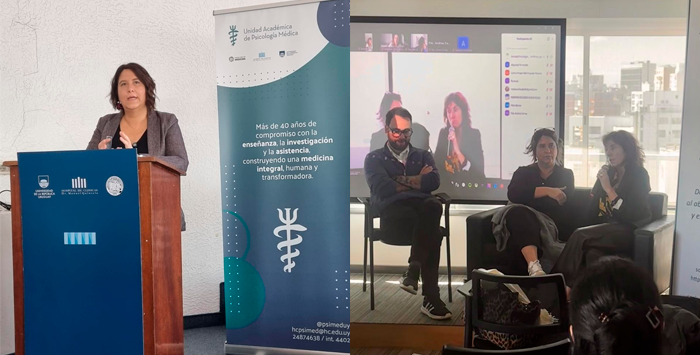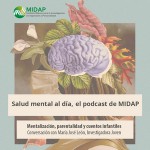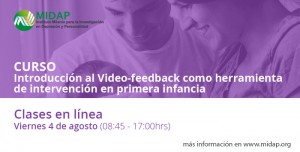
Course: Introduction to Video Feedback as an Intervention Tool in Early Childhood, August 2023
DESCRIPCIÓN GENERAL Las intervenciones centradas en la parentalidad han sido catalogadas dentro de las más eficaces para promover el bienestar y prevenir dificultades durante la infancia (Riera, 2016; Piquero et al., 2016). En este contexto, el video-feedback constituye una herramienta de intervención privilegiada (Facchini, Martin & Downing, 2016; Hoivik et al., 2015), con numerosas investigaciones que muestran su eficacia en la calidad de las interacciones y los vínculos, así como en variables asociadas a la salud mental y el desarrollo infantil (Borelli et al, 2019, O´Hara, 2019, Fukkink, 2008; Olhaberry et al., 2019; Olhaberry et al., 2017; Olhaberry, León, Seguel, M. & Mena, 2015; Rusconi-Serpa, Sancho-Rossignol & McDonough, 2009; Yagmur, Mesman, Malda, Bakermans-Kranenburg & Ekmekci, 2014; Steele et al., 2014). Especialistas en psicoterapia destacan la importancia de considerar los aspectos mentales que subyacen el comportamiento, para comprender las interacciones entre padres/madres e hijos/as (Fonagy, Gergely & Jurist, 2018; Sharp & Fonagy, 2008), reconociendo la capacidad de mentalización del cuidador como un elemento clave para responder sensiblemente a las necesidades infantiles y promover una mayor seguridad en el apego (Borelli et al, 2019; Zeegers, M. A. J., Colonnesi, C., Stams, G.-J. J. M. & Meins, E, 2017). La función reflexiva parental o mentalización ha sido considerada un factor clave para el desarrollo afectivo y social, para el logro de la auto-regulación y la transmisión intergeneracional del apego (Fonagy, P., Steele, H. & Steele, 1991; Borelli et al 2018; Zeegers, M. A. J., Colonnesi, C., Stams, G.-J. J. M. & Meins, 2017). En este escenario, el video-feedback constituye una herramienta privilegiada para favorecer el funcionamiento reflexivo parental a partir de la observación de las interacciones en un espacio protegido y acompañado. Facilita la regulación de los cuidadores y la exploración de los estados internos en sí mismos y en sus hijos/as a partir de un acercamiento cuidadoso a los recursos, que favorece la comprensión de las dificultades. El taller en video-feedback busca potenciar también las habilidades reflexivas en el terapeuta identificando estados mentales y sus gatillantes en sí mismo y en las diadas o triadas que solicitan atención (Bateman & Fonagy, 2016). De esta manera, el o la paciente se encuentra en la mente del terapeuta y la principal preocupación no es la conducta, sino que los estados mentales que la sostienen (Allen, Fonagy & Bateman, 2008). En concordancia con lo expuesto, el Instituto Milenio para la Investigación en Depresión y Personalidad – MIDAP- ofrece el curso en modalidad a distancia “Introducción al Video-feedback como herramienta de intervención en Primera Infancia”, buscando entregar contenidos fundamentales acerca de esta técnica y sus formas de aplicación. Considera el marco teórico general y su uso en diferentes contextos relacionales en los que los niños pequeños participan (díadas madre/padre-hijo/a; tríadas familiares) y entrega herramientas básicas para su uso en psicoterapia tanto presencial como online. DIRIGIDO A: Profesionales que realizan intervenciones terapéuticas con familias y niños/as pequeños/as; psicólogos, médicos familiares, psiquiatras, trabajadores sociales y terapeutas ocupacionales. OBJETIVO GENERAL: Entregar contenidos teóricos y prácticos iniciales para la comprensión del video-feedback en el trabajo con niños pequeños y sus familias. OBJETIVOS ESPECÍFICOS: Lograr un conocimiento introductorio de aspectos teóricos y prácticos fundamentales para el uso del video-feedback en el contexto clínico en primera infancia. Conocer las habilidades para el uso de estrategias y técnicas para la grabación, observación y análisis de los videos para realizar video-feedback, asociadas a motivos de consulta y focos terapéuticos específicos. Conocer las estrategias específicas de retroalimentación para las sesiones de video-feedback, vinculadas a posibles focos terapéuticos. [/fusion_text][fusion_imageframe image_id=”28701″ max_width=”” style_type=”none” stylecolor=”” hover_type=”none” bordersize=”” bordercolor=”” borderradius=”” align=”none” lightbox=”no” gallery_id=”” lightbox_image=”” alt=”” link=”” linktarget=”_self” hide_on_mobile=”small-visibility,medium-visibility,large-visibility” class=”” id=”” animation_type=”” animation_direction=”left” animation_speed=”0.3″ animation_offset=””]http://midap.org/wp-content/uploads/2023/06/Captura-de-Pantalla-2023-06-05-a-las-10.56.24-600×399.png[/fusion_imageframe][fusion_text columns=”” column_min_width=”” column_spacing=”” rule_style=”default” rule_size=”” rule_color=”” class=”” id=””] METODOLOGÍA: Clases expositivas Observación y análisis de casos Revisión de material audiovisual Revisión y discusión bibliográfica EQUIPO DOCENTE: Marcia Olhaberry Huber. Doctora en Psicoterapia, Pontificia Universidad Católica de Chile y Universidad de Heidelberg, Alemania. Psicóloga, Licenciada en Psicología, Universidad de Chile. Profesora Asociada Escuela de Psicología, Pontificia Universidad Católica de Chile. Subdirectora e Investigadora Asociada del Instituto Milenio para la Investigación en Depresión y Personalidad (MIDAP). Coordinadora Académica y Supervisora Programa de Salud Mental Perinatal, Red de Salud UC Christus. Directora Académica Diplomado en Psicopatología del Vínculo, UC. Principales líneas de estudio: Prevención e intervención en salud mental temprana, depresión perinatal, parentalidad, Interacciones y vínculos familiares diádicos y tríadicos. Catalina Sieverson Raddatz, Psicóloga, Doctora en Psicoterapia del Programa conjunto Universidad de Chile-Pontificia Universidad Católica de Chile e investigadora postdoctoral del Instituto Milenio para la Investigación en Depresión y Personalidad (MIDAP). Terapeuta Programa de Salud Mental Perinatal, Red de Salud UC Christus y del Programa de Apoyo a Embarazos de Alto Riesgo de la Clínica Universidad de Los Andes y Clínica Dávila. Principales líneas de estudio: mentalización en intervenciones en salud mental perinatal y temprana y Prevención en salud mental infantil temprana. María José León Papic, Psicóloga, Doctora en Psicoterapia del Programa conjunto Universidad de Chile – Pontificia Universidad Católica de Chile. Psicóloga y Magister en Psicología Clínica Universidad Adolfo Ibáñez. Investigadora responsable de Fondecyt de Postdoctorado. Investigadora Joven del Instituto Milenio para la Investigación en Depresión y Personalidad (MIDAP). Docente universitaria. Principales líneas de estudio: vínculos tempranos, mentalización y desarrollo socio-emocional infantil. Organiza: Con la colaboración de: [/fusion_text][fusion_text columns=”” column_min_width=”” column_spacing=”” rule_style=”default” rule_size=”” rule_color=”” class=”” id=””] BIBLIOGRAFÍA BÁSICA: Doria, M., Kennedy, H., Strathie, C. & Strathie, S. (2014). Explanations for the Success of Video Interaction Guid- ance (VIG): An Emerging Method in Family Psychotherapy. The Family Journal: Counseling and Therapy for Couples and Families, 22, 78-87. doi: 10.1177/1066480713505072 Facchini, S., Martin, V. & Downing, G. (2016) Pediatricians, Well-Baby Visits, and Video Intervention Therapy: Feasibility of a Video-Feedback Infant Mental Health Support Intervention in a Pediatric Primary Health Care Setting. Frontiers in Psychology, (7),

